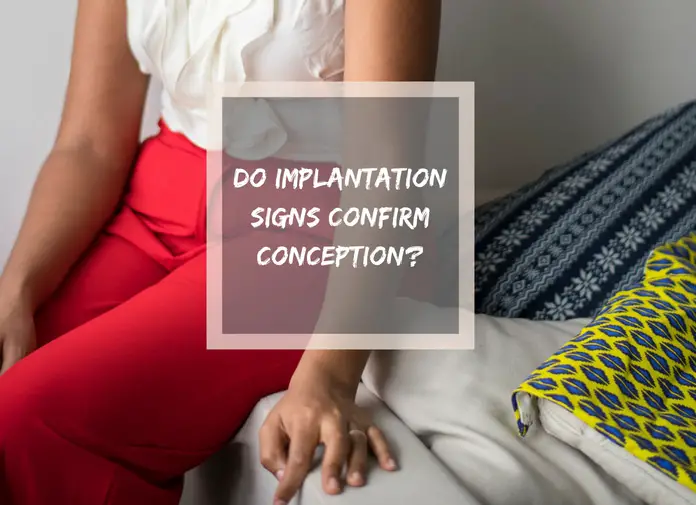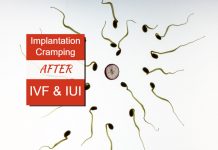Do implantation signs confirm conception? Implantation signs confirm conception but don’t guarantee viability. You have a higher risk of miscarriage in the first trimester than the following weeks. Moreover, the signs of implantation are mild and difficult to feel. You may confuse between PMS and implantation cramps. A positive pregnancy test is the first confirmatory result that you’re pregnant.
Do Implantation Signs Confirm Conception?
When you are trying to get pregnant, you might want the sure-shot formula for pregnancy. While that may not exist as a single answer for millions of women with different bodies, sure-shot signs do exist.
Out of the endless things, your friends tell you about pregnancy symptoms; the most reliable is implantation.
Implantation signs are the first step. After implantation the chances of having a miscarriage or a pregnancy defect are bleak.
One needs to understand this with the caution that implantation itself has very mild and blending signs.
You might not even come to know that implantation occurred and take it as mid-cycle spotting. Cramping is something women know to ignore until there is the return of monthly ritual.

Implantation signs
Ovulation, period and pregnancy have a point where they diverge. This point of similar symptoms is what you feel during implantation.
Period and pregnancy have such dominating symptoms that anything less than that is meant to be ignored. Because of this reason, most women never come to know about implantation until they take a pregnancy test.
A pregnancy test also reaches its accuracy after implantation, thus making it incapable of detecting it.
Most implantation signs like spotting, cramping, nausea and implantation dip can be an indication of pregnancy.
But the time of implantation is such that it all passes off quickly. You will rarely be able to realize that the cramps you had a week before period was implantation.
When your period is late, you try to recall the deed and where you erred. But rarely will you try to remember that pain or spotting you had a week before.
Sometimes the spotting will go along the cervical mucus when you go to the loo.
When do you see first implantation symptoms?
Implantation is the process of attachment of the embryo to the wall of the uterus. After fertilization, the egg undergoes many divisions.
The following divisions of egg into smaller units take less time than the previous. As the number of blastomeres goes up, the divisions are rapid.
The first division of egg is after thirty hours from fertilization. After the egg has 64 small units, it is ready for attaching to the back wall of the uterus for obtaining nutrients from the mother’s body.
The first implantation symptoms begin now.
When the blastocyst implants in the endometrial lining it creates a pulling and tugging sensation. If the intensity is high, then you may call it is as cramping.
Later on, as the blastocyst moves forward inside the lining, it crushes the blood vessels. It leads to the next symptoms of implantation – implantation bleeding or spotting.
After this, the growing embryo starts producing the pregnancy hormones guided by hCG.
That is when you feel giddy and nauseous because of implantation.
A little after, your urine will have hCG, and you will get a positive pregnancy test. Now signs of pregnancy will take over from here.
Are there any signs of implantation that you feel during early pregnancy?
The last line brings us to this question, “Do implantation signs continue in early pregnancy?”
As already stated implantation signs are common with period, ovulation and pregnancy. It is only one sign that differentiates implantation from all the three.
The implantation dip of BBT is the slight reduction in the basal body temperature after ovulation.
Most implantation signs will continue in the early pregnancy stage. You will have brown discharge during pregnancy that looks like implantation bleeding.
Nausea and morning sickness have everything in common except that nausea may be without pregnancy.
Bloating and cramping continues during the entire duration of pregnancy and also happens during implantation.
Common signs of implantation and early pregnancy also have any random illness.
During implantation, the mother’s immune system suppresses due to certain factors produced by the blastocyst. It can cause cold or flu and any infection.
Is implantation cramping normal?
Implantation cramps that feel like mild tingling sensations are common. About 33% of women have implantation bleeding and symptoms.
Implantation cramps may also signal pregnancy defects.
If the cramps during implantation get unbearable and painful, then you may be having an Ectopic pregnancy.
It is when the blastocyst instead of implanting in the uterus implants in the tubes.
Any blockages or scars can cause such defects. If you don’t tell your doctor about such pain, then you will have to suffer.
Tubal pregnancy can lead to the condition which requires the removal of ovary and tube. The fertility of woman will reduce for future after such a surgery.
If reported at an early stage, cramps due to ectopic pregnancy can be treated by chemicals that can detach the embryo.
Methotrexate flooding can treat the condition without any surgery. It is essential to understand that what degree of pain during implantation is normal.
If you cross the threshold, then tell your gynecologist immediately to avoid further complications.
Normal implantation cramps will only feel like tingling sensations and a light downward pull.
If you are sensitive, then the pain will be toward the back wall of the uterus. Implantation mostly occurs at the rear wall of the uterus because it is thick.
Implantation signs and pregnancy test
How soon can you tell if you are pregnant? As soon as the pregnancy test is kind enough to tell you, you’ll know you are pregnant.
Before that, you would rarely go to a doctor with no reasons to validate your prediction about pregnancy.
Just because you had unprotected sex, you can tell a doctor that you might be pregnant.
Only after implantation, such a prediction is practical. After you see symptoms of implantation in you, you should consult your doctor.
But nowadays the step before the pregnancy blood test is to take a home pregnancy test.
For taking a home pregnancy test, every woman wants to know the right time.
At the time of implantation, the level of hCG is about two nmol/L. After this, the level of hCG goes on doubling every 48 hours.
A pregnancy test is best done after five days from implantation which is the time of the expected period, and most pregnancy tests have an accuracy of 99% from that day onwards.




![Implantation Bleeding With Twins [How long does IB last with twins?] Implantation Bleeding With Twins](https://www.pregnanteve.com/wp-content/uploads/2019/01/implantation-bleeding-with-twins-218x150.jpg)





What does it mean when I have a lot of qurthering in my lower stomach an have went there explanation as well
Just one sign isn’t enough for us to be able to say anything.